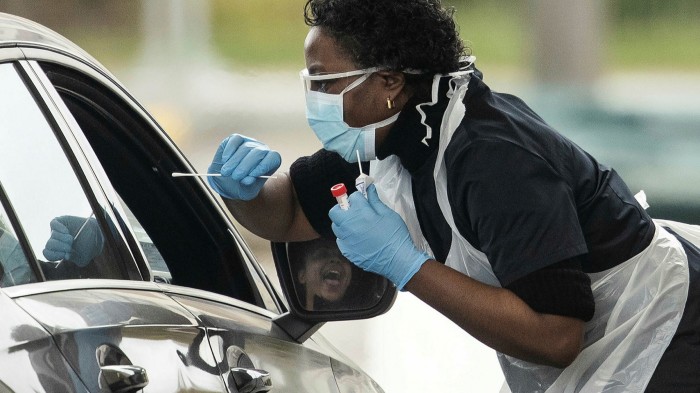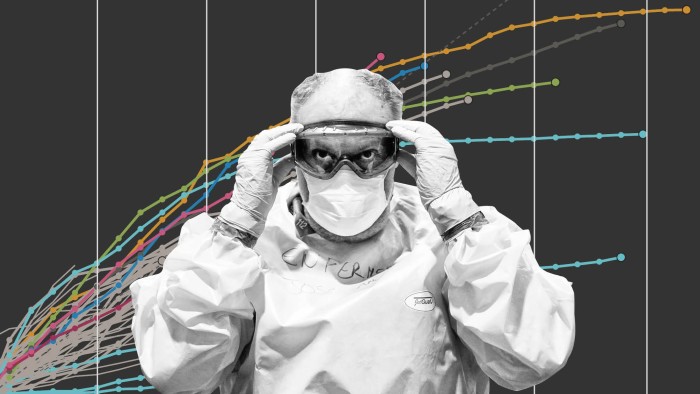UK medicines watchdog warns over unsafe coronavirus tests

Roula Khalaf, Editor of the FT, selects her favourite stories in this weekly newsletter.
The UK’s medicines regulator has sounded the alarm over unsafe and unlicensed coronavirus tests, warning that unscrupulous suppliers are seeking to exploit people’s desperation to be screened for the disease.
The Medicines and Healthcare Products Regulatory Agency, which assesses medicines and medical devices, said it was working urgently to investigate a large number of potential scams and had already taken down several fraudulent websites.
The regulator is particularly worried about the marketing of self-testing kits for use at home that would allow people to test for antibodies to see whether they have recovered from coronavirus. Several antibody tests are currently being validated by scientists in Oxford for accuracy, but none are approved for sale to the general public.
“We are investigating a large number of allegations of non-compliance relating to the selling of medical devices for use during this Covid-19 outbreak,” Graeme Tunbridge, interim director of devices at the MHRA, told the Financial Times.
Fraudsters have sought to cash in on strong demand for Covid-19 testing kits and protective equipment, both of which are in short supply. An international investigation in March, co-ordinated by Interpol, identified 2,000 illicit online adverts relating to Covid-19 and more than 34,000 unlicensed and fake products.
In the UK, the government has caused confusion by repeatedly promising a rollout of fingerprick Covid-19 antibody self-testing kits, which could produce results within minutes. However, the antibody tests currently on the market are only approved for use by healthcare professionals.
Nevertheless, several websites claim to be selling home-testing kits. Some note in their small print that they may only be bought by medical professionals — and in some cases this caveat was only added in the past few days.
Doris-Ann Williams, the chief executive of the British In Vitro Diagnostic Association, said the MHRA was “very concerned that there will be [unlicensed Covid-19] tests marketed to the public illegally, as there is a demand for them”.
Given the global demand for testing kits, “there will no doubt be ‘cowboy’ companies trying to make money”, she said.
Part of the problem is a lack of oversight. Manufacturers selling certain products, including medical devices, in the EU must “CE mark” their products, which indicates conformity with health, safety and environmental protection standards. However, manufacturers self-report compliance, and a CE mark is not evidence of third-party testing.
“That’s completely inadequate,” said Dr Alexander Edwards, an immunologist at Reading university. “All you can do is hope the manufacturer does keep their promises,” he said.
In order for medical devices to be sold for self-use, manufacturers must apply to the regulator for an additional level of approval.
“We are unaware of any legitimate, CE-marked tests for home use, and it is illegal to supply such products,” Mr Tunbridge said.
Even governments have struggled to obtain reliable kit. In recent days, the Netherlands, Spain and Turkey have all claimed that there were problems with products they had imported from China, including masks and tests.
Saul Khan, executive director of Rapidward, an Australian non-profit organisation selling Covid-19 tests, said that in the hurry to obtain supplies, “people aren’t behaving professionally”.
Mr Khan said buyers were “not checking their [suppliers] properly” and some sellers were “not getting real export licences”.
He said Rapidward had been approached by National Health Service staff and pharmacies looking to buy self-testing kits, whom it had declined to serve given that the tests were not approved for self-use and the company did not sell to individuals. The Financial Times reviewed emails that confirmed this.
As well as poor due diligence, faulty products could be the result of under-testing, if manufacturers rush out products, or poorly quality-controlled production facilities, where some items are made correctly and others are not.
Editor’s note

The Financial Times is making key coronavirus coverage free to read to help everyone stay informed. Find the latest here.
Scammers are also looking to profit from the coronavirus crisis. Emails reviewed by the FT showed that individuals purporting to be from labs that appeared not to exist had contacted Rapidward asking for masks and tests.
Mr Khan said he believed there were a number of “fake labs” that were trying to glean information about medical manufacturers and distributors, such as email signatures and certifications, in order to pose as legitimate sellers and scam buyers into making fake sales.
Comments